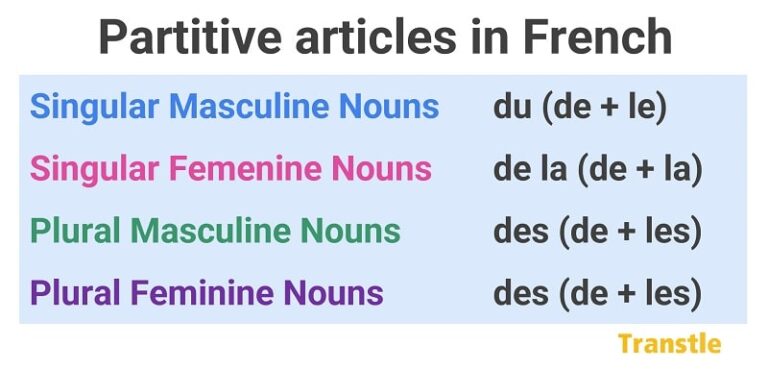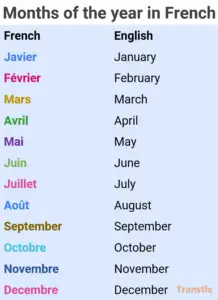Partitive articles in French: du, de la, des – Guide, Rules, Exercises

Partitive Articles are words in French that are used before nouns that are not measurable. They do not have exact equivalents in English, but they can be thought of as meaning “some” or “a bit of.”
Forms of Partitive Articles
- Masculine singular: du (de + le)
- Feminine singular: de la (de + la)
- Masculine plural: des (de + les)
- Feminine plural: des (de + les)
Examples
- Je mange du pain. (I am eating some bread.)
- Tu veux de la viande? (Do you want some meat?)
Milk and meat are generic nouns that define a type of product, they are not measurable or countable since you cannot count a milk (two milks, four meats) because you are talking about those products in a generic way and it is not the same as saying “a glass of water”, or “two pieces of meat.”
Negative Sentences
In negative sentences, the partitive article changes to a single form for both masculine and feminine: de
- Je ne bois pas de lait. (I do not drink milk.)
- Tu ne veux pas de pain. (You do not want bread.)
Exception to negative sentences
In negative sentences with the verb “être” and a countable noun in the plural or an uncountable noun, the partitive articles are usually retained, even though the sentence is negative.
- Ils ne sont pas des étudiants. (They are not students.) NOT Ils ne sont pas d’étudiants
Other Exceptions
Partitive articles are not used and “de” is maintained in the following cases:
When using quantity adverbs such as beaucoup (much) or assez (enough), or peu (little) trop (too much) the original partitive article is transformed back into de.
Some quantity adverbs are: Un peu de: a little bit of; beaucoup de: a lot of; pas de: no (some of); quelques: some; tant de: so much/many
Examples
- J’ai mangé beaucoup de pain aujourd’hui. (I ate a lot of bread today.)
- J’ai mangé un peu de fromage. (I ate a little bit of cheese.)
- Il y a beaucoup de monde ici. (There are many people here.)
- Il y a tant de choses à voir! (There are so many things to see!)
With numeral adjectives: In the case of sentences that have words like un, une, the preposition de is maintained.
- Un verre de lait (A glass of milk)
- Un plat de viande (A plate of meat)
With qualifying adjectives: If there are qualifying adjectives before an uncountable or plural noun, the preposition de is also maintained.
- J’ai acheté de belles fleurs. (I bought beautiful flowers.)
- J’ai acheté des pommes. (I bought apples.)
- J’ai acheté de belles pommes. – (I bought beautiful apples.)
With verbs like aimer (to love) préférer (to prefer) adorer (to adore) they use the definite articles. Le, la, les (The, the, the, the).
- Je déteste le foie de vache. (I hate beef liver.)
Practice
Here you have the sentences in English for you to translate into French, taking into account the rules, negatives and exceptions of the partitive articles, try to translate them on your own and then compare with the answers at the end.
- I don’t drink milk.
- I want bread.
- They are not students.
- You have eaten a lot of sugar.
- I ate some cheese.
- I want a glass of coffee.
- There are few people.
- They want salad.
- I want to see beautiful flowers.
Answers
- Je ne bois pas de lait.
- Je veux du pain.
- Ce ne sont pas des étudiants.
- Vous avez mangé beaucoup de sucre.
- J’ai mangé du fromage.
- Je veux un verre de café.
- il y a peu de gens.
- Ils veulent de la salade.
- Je veux voir de belles fleurs.


